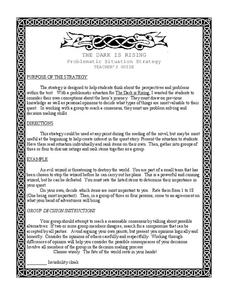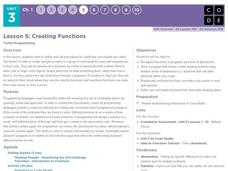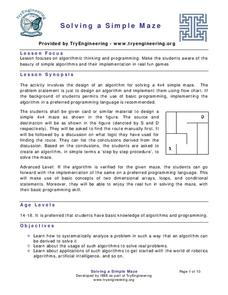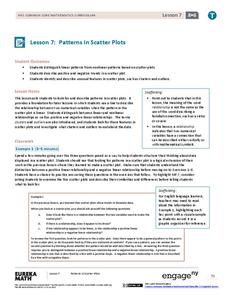Curated OER
Find Parabolas through Two Points
Your learners will write quadratic functions whose graphs include specific points and explore how these graphs are related to each other.
Jen London
Julius Caesar Funeral Speech Essay Assignment
"Romans, countrymen, and lovers! Hear me for my cause." "Friends, Romans, countrymen, lend me your ears!" As part of a study of William Shakespeare's Julius Caesar, individuals as asked to compare the funeral speeches of Brutus and Mark...
Curated OER
Create Your Own Country Project
Young scholars demonstrate their knowledge of geography with this fun, collaborative social studies project. Working in small groups, students develop their very own countries, writing descriptions of their physical location, social...
Center for Mathematics and Technology
Whole Numbers: Using an Area Model to Explain Multiplication
There are many ways to work through a multiplication problem. Using an area model, kids complete several worksheets with different types of multiplication problems, including multiplying by ten, and explain how the new strategies differ...
Happy Moose Apps
Bitsboard - Education, Games, and Flashcards for Learning Reading, Spelling, and more
Learn everything from sight words to French vocabulary with this versatile study app. While the material that comes pre-loaded on the app is mostly based on learning how to read and spell, the app has the potential to be useful for any...
Lerner Publishing
Meet the Dinosaurs
Take your class of youngsters on a prehistoric adventure with this four-lesson series on dinosaurs. Accompanying the Meet the Dinosaurs books by Don Lessem, these lessons engage children in writing their own dinosaur books, making...
Curated OER
Understanding the Influence of the Media
Critically analyze advertising techniques, such as circular reasoning, bandwagon, testimonial, and repetition, with worksheets that effectively discuss and illustrate how the media aims to influence.
Curated OER
Phineas Gage: “This I Believe” Venn Diagrams After Reading Strategy
Difficulties with brain injuries still continue today. After reading Phineas Gage: A Gruesome but True Story About Brain Science, class members read a series of modern personal essays about brain injuries and choose an essay to compare...
Houghton Mifflin Harcourt
That’s Amazing!: Challenge Activities (Theme 3)
Synonym dominoes, anyone? As part of the activities designed for kids who have mastered the basic concepts in the Houghton Mifflin Harcourt thematic unit That's Amazing! kids are offered a variety of activities that include developing a...
Saskatchewan Elocution and Debate Association
Grab ‘N Go Debate
Here's a resource that provides debaters with the background information and worksheets they will need when planning a policy debate. Templates and sentence frames, as well as a rationale for using debates in the classroom, are included...
ReadWriteThink
Persuasive Techniques in Advertising
Help your 21st century learners develop their media smarts with this resource that has them examine the persuasive techniques advertisers use to influence specific demographics and then to use these techniques to craft their own ads.
Novelinks
The Dark Is Rising: Problematic Situation Strategy
What items would you need to save the world from an evil wizard? Prior to reading Susan Cooper's young adult contemporary fantasy The Dark is Rising, and to generate interest in the tale, class groups must reach consensus on a list of...
Code.org
Creating Functions
Quit repeating yourself ... you can make this simpler! Rather than repeating the same set of code over and over, class members learn to build and call functions in a series of challenges in App Lab. In the end, they combine functions to...
Curated OER
Solving a Simple Maze
It is a-maze-ing how lost one can get. Teams reconstruct a simple maze and solve it. Participants create an algorithm that a robot would follow in order to solve the maze as well. The activity includes an extension directing pupils to...
Teach Engineering
What Does Light See?
The second installment of a seven-part series focuses on the refraction of light and how it affects the colors we see. Learners consider how this concept connects to biosensors for cancer detection.
Bowland
Fruit Pies
Scholars use formulas for the area of a circle and the area of a rectangle to determine the number of pies a baker can make from a particular area of dough. They must also take into account rolling the remaining dough into a new sheet.
Polar Trec
Plankton Parents
Plankton are so abundant in the ocean they outweigh all of the animals in the sea. In this three day activity, groups discuss and become familiar with plankton, capture females, and look for egg production on day three.
TryEngineering
Solving a Simple Maze
Solve a maze ... from a robot's point of view. In the lesson, your scholars build a small, simple maze from cardboard and then find a route from the start point to the finish point. They write an algorithmic process that a robot could...
EngageNY
Patterns in Scatter Plots
Class members investigate relationships between two variables in the seventh installment of a 16-part module that teaches scholars how to find and describe patterns in scatter plots. Young mathematicians consider linear/nonlinear...
Chicago Botanic Garden
Recognizing Change (Observation vs. Inference)
What is the difference between making inferences and making observations? Young climatologists refer to a PowerPoint to make observations on each slide. They record their observations in a provided worksheet before drawing a...
Chicago Botanic Garden
Climate Change Around the World
You know climate change is happening when you see a bee take off its yellow jacket. Part four in a series of five lessons explores all factors affecting climate change: temperature, cloud cover, precipitation, and carbon dioxide. By...
Chicago Botanic Garden
Causes and Effects of Climate Change
It's time for your class to literally show what they know! Pupils illustrate what they learned about the causes and effects of climate change by filling out a graphic organizer to complete the 5-part series of lessons. They discuss them...
Chicago Botanic Garden
Climate Change Around the World
It is unknown if cloud cover increases in response to carbon dioxide levels changing, helping climate change slow down, or if cloud cover decreases, allowing Earth to warm faster. Part four in the series of five lessons has classes...
University of Minnesota
Dendritic Spines Lab
This is your brain on drugs ... literally! Your neuroscientists-in-training examine the evidence of drug use on the human brain and how neurons change their connectivity when altered by drugs. They then work together to create testing...
Other popular searches
- Logical Thinking and Reasoning
- Deductive Reasoning Skills
- Thinking & Reasoning Skills
- Inferential Reasoning Skills
- Inductive Reasoning Skills
- Logical Thinking Puzzles
- Deduction Reasoning Skills
- Math Reasoning Skills
- Practical Reasoning Skills
- Logical Thinking Hats
- Logical Thinking Writing
- Logical Thinking Math

























